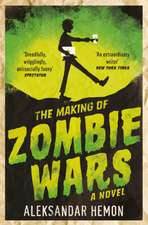Land
Autor Liam O'Flahertyen Limba Engleză Paperback – 19 dec 2012
Preț: 76.08 lei
Preț vechi: 104.10 lei
-27% Nou
Puncte Express: 114
Preț estimativ în valută:
14.56€ • 15.31$ • 12.03£
14.56€ • 15.31$ • 12.03£
Carte tipărită la comandă
Livrare economică 17 aprilie-01 mai
Preluare comenzi: 021 569.72.76
Specificații
ISBN-13: 9781448204472
ISBN-10: 144820447X
Pagini: 362
Dimensiuni: 153 x 234 x 19 mm
Greutate: 0.51 kg
Editura: Bloomsbury Publishing
Colecția Bloomsbury Reader
Locul publicării:London, United Kingdom
ISBN-10: 144820447X
Pagini: 362
Dimensiuni: 153 x 234 x 19 mm
Greutate: 0.51 kg
Editura: Bloomsbury Publishing
Colecția Bloomsbury Reader
Locul publicării:London, United Kingdom
Notă biografică
Liam O'Flaherty aka Liam Ó Flaithearta (1896-1984) was a significant Irish novelist and short story writer and a major figure in the Irish literary renaissance. O'Flaherty was the son of Maidhc Ó Flaithearta and Maggie Ganley of Gort na gCapall. In 1908, at the age of twelve, he went to Rockwell College. This was followed by enrollments at Holy Cross and University College, Dublin. He did not attend the first two schools for long. He had intended joining the priesthood, but in 1917 he left school and joined the Irish Guards under the name 'Bill Ganly'. He served on the Western Front, where he was injured, and it is possible that the shell shock he suffered may have been responsible for the mental illness which became apparent in 1933.After the war O'Flaherty left Ireland and moved to the United States, where he lived in Hollywood for a short time. The well-known director John Ford, a cousin, later turned Ó Flaithearta's novel, The Informer, into a film. Many of his works have the common theme of nature and Ireland. He was a distinguished short story writer, and some his best work in that genre was in Irish. In 1923, O'Flaherty published his first novel, Thy Neighbour's Wife, thought to be one of his best. In 1935, his novel The Informer (for which he had been awarded the 1925 James Tait Black Memorial Prize for fiction) was made into a film by John Ford. Over the next couple of years he published other novels and short stories. In 1933 he suffered from the first of two mental breakdowns.He travelled in the United States and Europe, and the letters he wrote while travelling have now been published. He had a love of French and Russian culture, and this may have been part of the attraction he felt towards communism. Before his death, however, he left the Communist Party and returned to the Roman Catholic faith.











